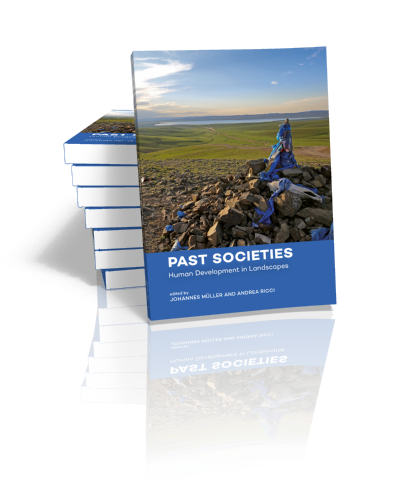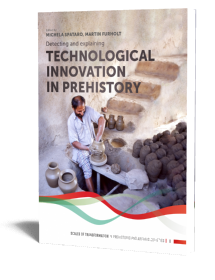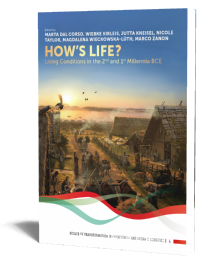Past Societies
Human Development in Landscapes
Edited by Johannes Müller and Andrea Ricci | 2020

Past Societies
Human Development in Landscapes
Edited by Johannes Müller and Andrea Ricci | 2020
Paperback ISBN: 9789088909245 | Hardback ISBN: 9789088909252 | Imprint: Sidestone Press | Format: 182x257mm | 208 pp. | Language: English | 17 illus. (bw) | 37 illus. (fc) | Keywords: landscape; society; environment; culture; interaction; interdisciplinary socio-environmental research | download cover | DOI: 10.59641/g6k7959i
Read online or downloaded 1696 times
-
Digital & Online access
This is a full Open Access publication, click below to buy in print, browse, or download for free.
-
Buy via Sidestone (EU & UK)
-
Buy via our Distributors (WORLD)
For non-EU or UK destinations you can buy our books via our international distributors. Although prices may vary this will ensure speedy delivery and reduction in shipping costs or import tax. But you can also order with us directly via the module above.
UK international distributor
USA international distributor
-
Bookinfo
Paperback ISBN: 9789088909245 | Hardback ISBN: 9789088909252 | Imprint: Sidestone Press | Format: 182x257mm | 208 pp. | Language: English | 17 illus. (bw) | 37 illus. (fc) | Keywords: landscape; society; environment; culture; interaction; interdisciplinary socio-environmental research | download cover | DOI: 10.59641/g6k7959i
Read online or downloaded 1696 times

We will plant a tree for each order containing a paperback or hardback book via OneTreePlanted.org.
The Kiel Graduate School ‘Human Development in Landscapes’ has conducted research on socio-environmental issues of past societies during the last years. From the North Atlantic to the Persian Gulf and from Peru to the Near East, different attempts on the interfluve of environments and societies in landscapes describe certain historical moments and processes in which the interplay of ecological and societal factors is entangled. Events, processes and structures are described on local, regional and global scales as well as methodological developments on ecological and societal archives.
The selected case studies are linked by the general idea of the ability to integrate discovery, documentation, description and interpretation within the scope of analyses and synthesis. Thus, the interdisciplinary framework of the Kiel Graduate School formed the agenda for a holistic approach. ‘Landscapes of power’, transitions during neolithisation processes, maritime and other networks, site formation dynamics, ‘landscapes of identities’ and the ‘making of heritage’ are only a few topics included in this book. The closeness of human behaviour in certain environmental conditions becomes obvious despite the often huge distance in time and space. At the same time, one of the strengths of humanistic science becomes apparent: its commitment to a culture of knowledge across borders.
Preface
Johannes Müller and Andrea Ricci
Introduction: Concepts of Human Developments in Landscapes: A Structured Research Program
Johannes Müller and Andrea Ricci
Transitions during Neolithisation Processes in Southern Scandinavia: New Insights from Faunal Remains and Pottery from the Site Neustadt LA 156 in Northern Germany
Aikaterini Glykou
Interaction and Networks in the Neolithic Funnel Beaker Culture
Julia Menne
Development of Identification Criteria of Non-Dietary Cereal Crop Products by Phytolith Analysis to Study Prehistoric Agricultural Societies
Welmoed A. Out
Early Agriculture in Southern Peru
Hermann Gorbahn and Markus Reindel
Corded Ware and Bell Beaker between Rhine and Saale: Theories, Methods and Results
Ralph Großmann
Settlement History and Tell Formation Processes in the Birecik and Carchemish Sectors of the Euphrates River
Andrea Ricci
Writing the History of ‘Peoples without History’: The Case of the Zagros in the First Millennium BCE
Silvia Balatti
Iron Age Landscapes of Power in the Middle Rhine-Moselle Region
Manuel Fernández-Götz
Meteorological Medicine in the Hippocratic Corpus
Anne Liewert
Do as the Romans do? Human-Environmental Interactions in Ancient Southern Latium
Michael Teichmann and Hans-Rudolf Bork
Palynological Investigations on the Deposits of a Well Shaft from the Roman Iron Age with Special Reference to Non-Pollen Palynomorphs
Magdalena Wieckowska-Lüth and Dieter Bischop
Human-Landscape Interconnections: The Döberitzer Heide in the Early Middle Ages (ca. 7th-11th century) as a Space of Action between the Appropriation of Material Wealth and the Destruction of the Basis of Existence
Donat Wehner
Seafaring of the Hansa to the Shetland Islands, Faroe Islands and Iceland: The Maritime-Archaeological Potential of the North Atlantic Islands in the Late Hanseatic Period
Philipp Grassel
From Salamander to Siren: Landscapes of Identity
Maren Biederbick
Warscapes: Managing Space on the Western Front, 1914-1918
Christoph Nübel
Ethics in the Practice of Archaeology and the Making of Heritage: Understanding beyond the Material
Artur Ribeiro and Gustav Wollentz

Prof. dr. Johannes Müller
Johannes Müller (PhD, University of Freiburg, 1990) is a Professor and Director of the Institute for Prehistoric and Protohistoric Archaeology at Kiel University, Germany. He is the founding director of the Johanna Mestorf Academy, Speaker of the Collaborative Research Centre “Scales of Transformation: Human-environmental Interaction in Prehistoric and Archaic Societies”and of the Excellence Cluster “ROOTS – Social, Environmental, and Cultural Connectivity in Past Societies”.

Dr. Andrea Ricci
Andrea Ricci is an archaeologist specialised in the study of the prehistory of Southwestern Asia. He completed his first MA studies at La Sapienza University in Rome (Italy) and then he received a second MA degree at Durham University (UK). After completing his PhD in the framework of the Graduate School “Human Development in Landscapes” at Kiel University, he held a post-doctoral position at the Eurasia Department of the German Archaeological Institute. He is currently a scientific coordinator of the Cluster of Excellence ROOTS at Kiel University. He has conducted field projects in Azerbaijan, Georgia, and Syria.
Abstract:
The Kiel Graduate School ‘Human Development in Landscapes’ has conducted research on socio-environmental issues of past societies during the last years. From the North Atlantic to the Persian Gulf and from Peru to the Near East, different attempts on the interfluve of environments and societies in landscapes describe certain historical moments and processes in which the interplay of ecological and societal factors is entangled. Events, processes and structures are described on local, regional and global scales as well as methodological developments on ecological and societal archives.
The selected case studies are linked by the general idea of the ability to integrate discovery, documentation, description and interpretation within the scope of analyses and synthesis. Thus, the interdisciplinary framework of the Kiel Graduate School formed the agenda for a holistic approach. ‘Landscapes of power’, transitions during neolithisation processes, maritime and other networks, site formation dynamics, ‘landscapes of identities’ and the ‘making of heritage’ are only a few topics included in this book. The closeness of human behaviour in certain environmental conditions becomes obvious despite the often huge distance in time and space. At the same time, one of the strengths of humanistic science becomes apparent: its commitment to a culture of knowledge across borders.
Contents
Preface
Johannes Müller and Andrea Ricci
Introduction: Concepts of Human Developments in Landscapes: A Structured Research Program
Johannes Müller and Andrea Ricci
Transitions during Neolithisation Processes in Southern Scandinavia: New Insights from Faunal Remains and Pottery from the Site Neustadt LA 156 in Northern Germany
Aikaterini Glykou
Interaction and Networks in the Neolithic Funnel Beaker Culture
Julia Menne
Development of Identification Criteria of Non-Dietary Cereal Crop Products by Phytolith Analysis to Study Prehistoric Agricultural Societies
Welmoed A. Out
Early Agriculture in Southern Peru
Hermann Gorbahn and Markus Reindel
Corded Ware and Bell Beaker between Rhine and Saale: Theories, Methods and Results
Ralph Großmann
Settlement History and Tell Formation Processes in the Birecik and Carchemish Sectors of the Euphrates River
Andrea Ricci
Writing the History of ‘Peoples without History’: The Case of the Zagros in the First Millennium BCE
Silvia Balatti
Iron Age Landscapes of Power in the Middle Rhine-Moselle Region
Manuel Fernández-Götz
Meteorological Medicine in the Hippocratic Corpus
Anne Liewert
Do as the Romans do? Human-Environmental Interactions in Ancient Southern Latium
Michael Teichmann and Hans-Rudolf Bork
Palynological Investigations on the Deposits of a Well Shaft from the Roman Iron Age with Special Reference to Non-Pollen Palynomorphs
Magdalena Wieckowska-Lüth and Dieter Bischop
Human-Landscape Interconnections: The Döberitzer Heide in the Early Middle Ages (ca. 7th-11th century) as a Space of Action between the Appropriation of Material Wealth and the Destruction of the Basis of Existence
Donat Wehner
Seafaring of the Hansa to the Shetland Islands, Faroe Islands and Iceland: The Maritime-Archaeological Potential of the North Atlantic Islands in the Late Hanseatic Period
Philipp Grassel
From Salamander to Siren: Landscapes of Identity
Maren Biederbick
Warscapes: Managing Space on the Western Front, 1914-1918
Christoph Nübel
Ethics in the Practice of Archaeology and the Making of Heritage: Understanding beyond the Material
Artur Ribeiro and Gustav Wollentz

Prof. dr. Johannes Müller
Johannes Müller (PhD, University of Freiburg, 1990) is a Professor and Director of the Institute for Prehistoric and Protohistoric Archaeology at Kiel University, Germany. He is the founding director of the Johanna Mestorf Academy, Speaker of the Collaborative Research Centre “Scales of Transformation: Human-environmental Interaction in Prehistoric and Archaic Societies”and of the Excellence Cluster “ROOTS – Social, Environmental, and Cultural Connectivity in Past Societies”.

Dr. Andrea Ricci
Andrea Ricci is an archaeologist specialised in the study of the prehistory of Southwestern Asia. He completed his first MA studies at La Sapienza University in Rome (Italy) and then he received a second MA degree at Durham University (UK). After completing his PhD in the framework of the Graduate School “Human Development in Landscapes” at Kiel University, he held a post-doctoral position at the Eurasia Department of the German Archaeological Institute. He is currently a scientific coordinator of the Cluster of Excellence ROOTS at Kiel University. He has conducted field projects in Azerbaijan, Georgia, and Syria.
-
Digital & Online access
This is a full Open Access publication, click below to buy in print, browse, or download for free.
-
Buy via Sidestone (EU & UK)
-
Buy via our Distributors (WORLD)
For non-EU or UK destinations you can buy our books via our international distributors. Although prices may vary this will ensure speedy delivery and reduction in shipping costs or import tax. But you can also order with us directly via the module above.
UK international distributor
USA international distributor
- Browse all books by subject
-
Search all books

We will plant a tree for each order containing a paperback or hardback book via OneTreePlanted.org.
You might also like:
© 2025 Sidestone Press KvK nr. 28114891 Privacy policy Sidestone Newsletter Terms and Conditions (Dutch)








